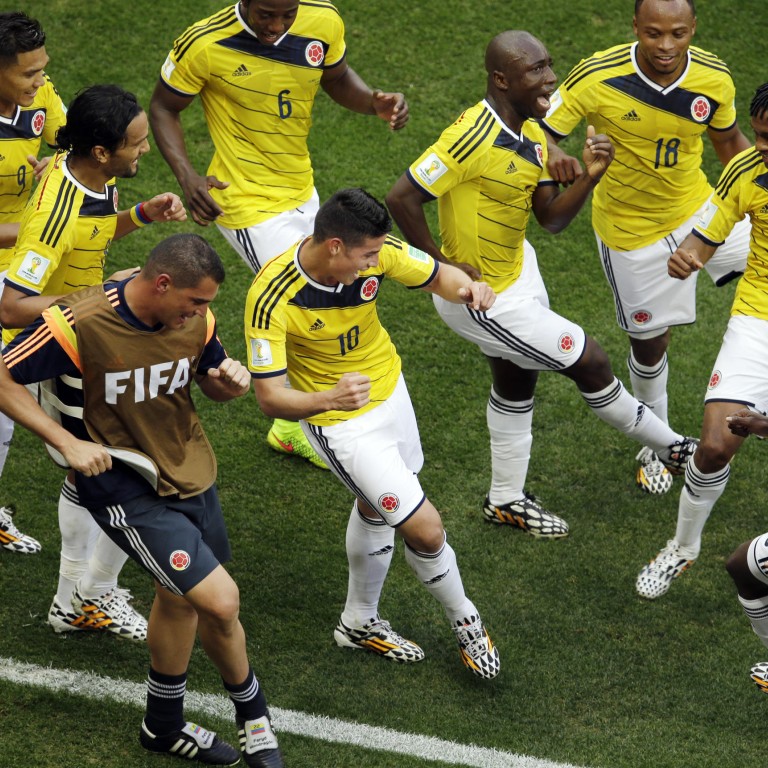
Brazil v Colombia: Euphoria deafening as Andean nation hopes to reinvent reputation
Not since Colombia drubbed Argentina 5-0 in a 1993 World Cup qualifier has the South American nation of 48 million been so enthralled by the beautiful game
The euphoria in Colombia is deafening, and wonderfully contagious, ahead of today's do-or-die match against hosts Brazil.
Never before has the star-crossed nation made the quarter-finals. Some are even waxing poetic about World Cup unity accelerating the pace of 18-month-old peace talks to end a half-century of conflict that has claimed some 220,000 lives.
Soccer is also as ephemeral as a particular game. And when this World Cup ends it will be like a passing fad, and we'll be back to our old habits
Half the population seems to be wearing the canary-yellow national jersey, even on days Colombia aren't playing.
And the merrymaking, from singing in the streets to collective game-watching on huge screens in public parks, is often so unrestrained that many big-city mayors have imposed bans on alcohol sales on game days.
The fear, of course, is that it all will be fleeting and the violence and intolerance that have long plagued the Andean nation will re-emerge at tournament's end.

"Soccer has always worked as a tool of union and a tool for nation-building," said Alexander Castro, a National University sociologist. "But soccer is also as ephemeral as a particular game. And when this World Cup ends it will be like a passing fad, and we'll be back to our old habits."
Not since Colombia drubbed Argentina 5-0 in a 1993 World Cup qualifier has the South American nation of 48 million been so enthralled by the beautiful game.
"Colombia is going to make it to the final because it has the fundamentals and preparation, and [the players] have great courage and desire," said Leonardo Soto, a 23-year-old paralegal in Bogota.
President Juan Manuel Santos is also devoted, and planned to attend today's contest.
The Colombian team's unselfish poise and grace are about the only thing Santos and his political nemesis, ex-President Alvaro Uribe, can agree on these days as they spar over the handling of peace talks with the Revolutionary Armed Forces of Colombia, or Farc.
And even the leftist Farc has claimed a stake in the cheering section. Before the tournament, rebel negotiators sent the team a letter that gushed "with people like you, we're sure to go far".
Aldo Civico, a Rutgers University anthropologist and conflict resolution expert, said "the joyful and intense expression of unity" around the Colombian team's four-game winning streak has let people "transcend the political tribalism" that has defined the nation's violent history.
It reminded him, he said, of how Nelson Mandela used South Africa's love of rugby as a tool of post-apartheid reconciliation.

The fear is that, lacking a Mandela, the unity will evaporate after the tournament is over.
No one, says former coach and player Alexis Garcia, wants to relive the anguish and shame Colombians felt after the July 2, 1994,slaying in a Medellin discotheque car park of 27-year-old defender Andres Escobar, who had knocked Colombia out of contention by accidentally kicking the ball into his own net in a game against the United States.
He was shot six times by the driver of two suspected drug traffickers, one of whom complained to him about his blunder 10 days earlier in Los Angeles.
Michael Zimbalist, who with his brother Jeffrey made the 2010 documentary about Colombian professional soccer's tainting by drug lords including Pablo Escobar, says the nation deserves credit for largely cleaning itself up in the years since both Escobars were killed.
It was heartwarming, said Jeffrey, how football extended to a country's sense of identity and allowed the world to see a side of Colombia it did not know.
Which is not to say that either brother believes drug money is all gone from the sport.
In 2006, a drug trafficker affiliated with far-right militias named Gustavo Upegui was slain in his bedroom by a gun-wielding intruder.
Upegui had been running the Envigado club just outside Medellin and had recently purchased the rights to an adolescent he thought had a brilliant future.
In fact, that player currently leads all World Cup scorers, with five goals.
His name: James Rodriguez
